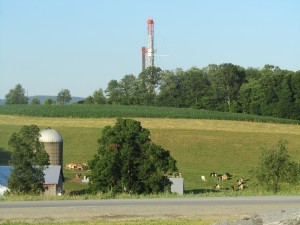Study Finds Little Evidence of Water Contamination from Fracking
The Penn State University study monitored more than 200 drinking water wells near Marcellus Shale gas drilling sites for an 18 month period. Researchers say the sites ranged over 20 counties, and did not show a statistically significant link between shale gas drilling and methane contamination.
What the study did show was that between 20 to 25 percent of the wells tested for methane showed the presence of gas before any drilling occurred. The concentrations of the gas were low, and the research concluded that the methane occurred naturally.
Originally, researchers did report finding higher levels of bromide in private drinking water wells. They connected it to drilling, not to the fracking process. But they have since attributed the high levels of bromide in all but one well to lab errors. Bryan Swistock is a water specialist at Penn State, and led the study. Swistock says no wells tested for bromide before drilling.
“It indicates that there needs to be broader research to find out where it’s coming from,” said Swistock.
He says bromide is not a health hazard on its own. But when combined with some disinfectants, it can be harmful. Swistock says they also tested for up to 18 chemicals, including barium, chloride, and sulfate. But the tests did not reveal elevated levels of anything except bromide.
Swistock acknowledged the study included a relatively small number of sites, over a short period of time.
The study was conducted by Penn State’s College of Agricultural Sciences and funded by the Center for Rural Pennsylvania and the Pennsylvania Water Resources Research Center. The state legislature funds the Center for Rural Pennsylvania, and the U.S. Geological Survey supports the Water Resources Research Center.
Swistock says he did not want to take any funding from either industry or environmental groups.
“This is the first project to provide an unbiased and large-scale study of water quality in private water wells…both before and after the drilling of Marcellus gas wells nearby,” said Swistock.
Swistock, like many researchers looking into Marcellus Shale drilling, is concerned about accusations of bias.
Penn State did not randomly select the wells. Instead, researchers asked for the participation of residential well owners. Swistock says despite detailed tests, many residents did not know how to interpret their water test results.
“We found a lot of pre-existing problems,” said Swistock. “It really indicates a need for education.”
Penn State will seek funding to continue to monitor the wells.

















